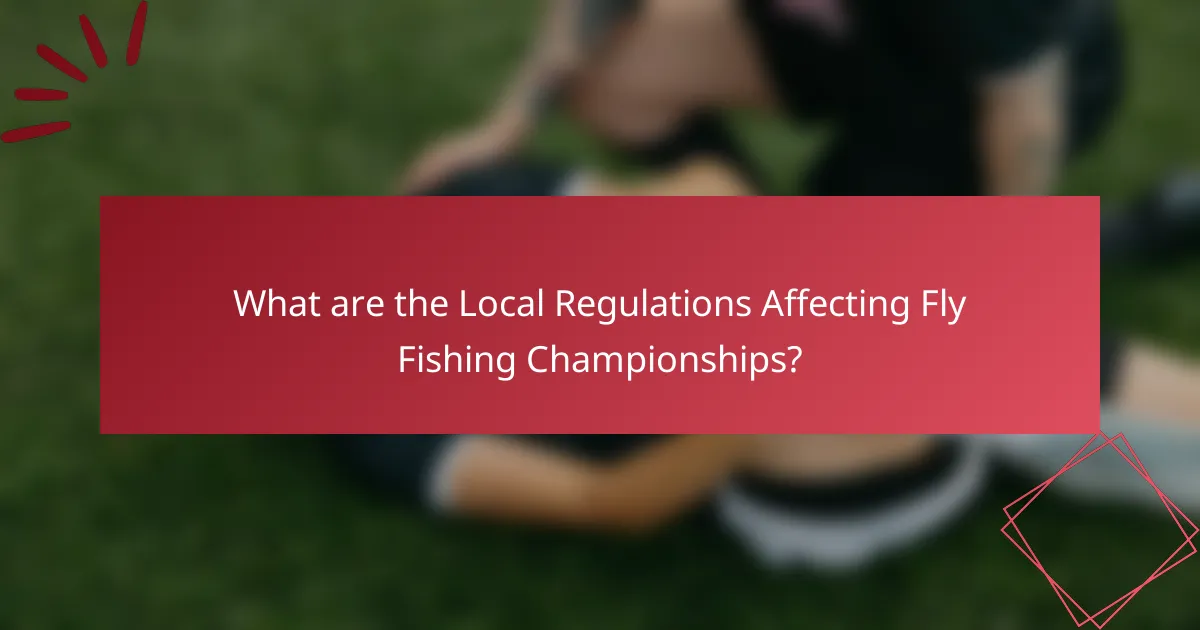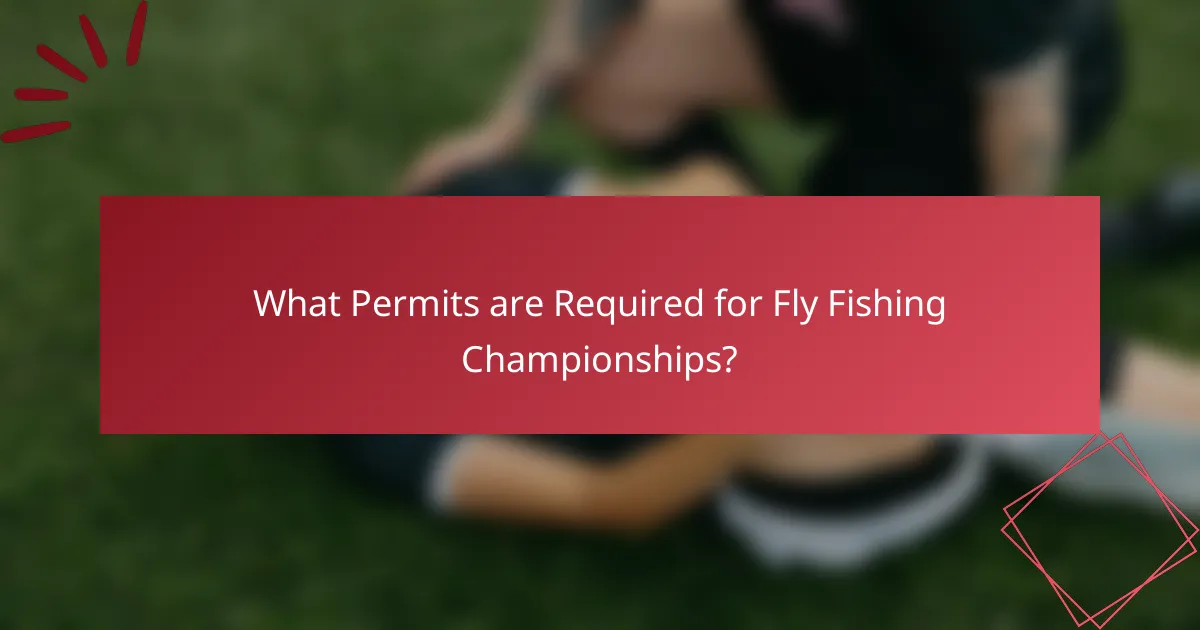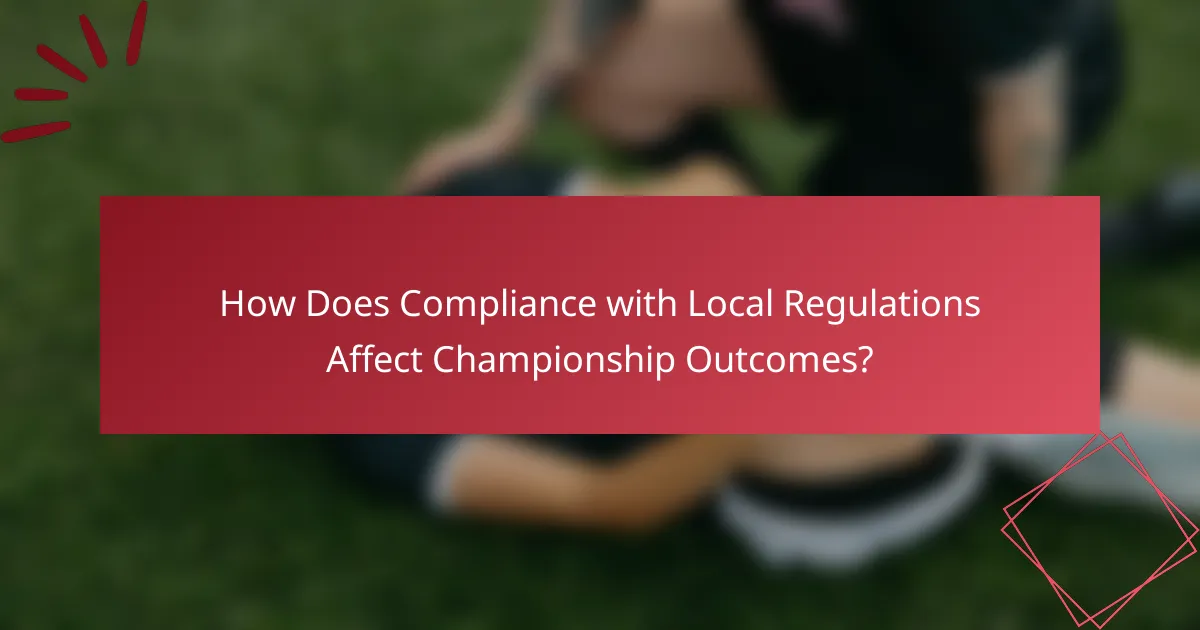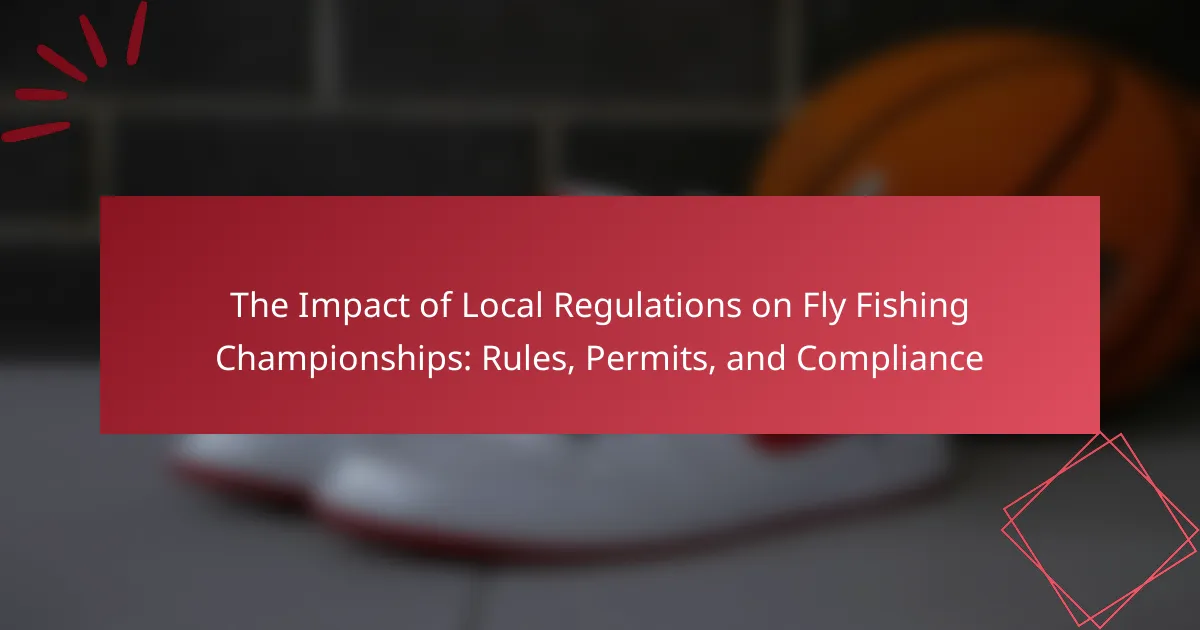Local regulations significantly influence fly fishing championships through requirements for permits, designated fishing areas, and seasonal restrictions. Each state or region enforces specific rules that govern fishing practices, including closures during spawning seasons to protect fish populations and restrictions on gear and bait usage. Compliance with these regulations is crucial for maintaining fairness, safety, and the integrity of competition outcomes, as violations can lead to disqualification. Additionally, both a fishing permit and an event permit are necessary to ensure adherence to local laws and conservation efforts, impacting strategy and performance in the championships. Organizations like state fish and wildlife agencies oversee these regulations to promote sustainability and manage public safety during events.

What are the Local Regulations Affecting Fly Fishing Championships?
Local regulations affecting fly fishing championships include permit requirements, designated fishing areas, and seasonal restrictions. Each state or region may have specific rules governing fishing practices. For example, certain waters may be closed during spawning seasons to protect fish populations. Additionally, regulations often dictate the types of gear and bait that can be used. Compliance with local wildlife management policies is essential. Violating these regulations can lead to disqualification from competitions. Various organizations, such as state fish and wildlife agencies, oversee these regulations to ensure sustainability.
How do local regulations vary across different regions?
Local regulations for fly fishing championships vary significantly across different regions. Each region establishes its own rules based on local environmental conditions and fish populations. For instance, some areas may have specific seasons for fishing to protect spawning fish. Other regions might impose restrictions on the types of bait or tackle that can be used. Additionally, permit requirements can differ, with some areas requiring special permits for competitive events. The enforcement of regulations also varies, with some regions having strict monitoring and penalties for non-compliance. Historical data shows that regions with diverse ecosystems often have more complex regulations to ensure sustainability.
What factors contribute to the differences in regulations?
Differences in regulations are influenced by various factors. Local environmental conditions shape regulations to protect specific ecosystems. Cultural attitudes towards fishing can lead to varying rules and practices. Economic considerations often dictate regulations to balance industry needs with conservation efforts. Legal frameworks differ across regions, impacting enforcement and compliance. Stakeholder interests, including local communities and conservation groups, play a significant role in shaping regulations. Historical practices and traditions also contribute to the evolution of local rules. These factors collectively create a diverse regulatory landscape for fly fishing championships.
How do these variations impact fly fishing practices?
Variations in local regulations significantly impact fly fishing practices. These regulations dictate the types of gear allowed, fishing seasons, and specific water bodies that can be fished. For instance, some regions may restrict the use of certain lures or require specific permits for catch-and-release practices. Compliance with these rules ensures sustainable fishing and conservation of fish populations. Additionally, variations can affect competition formats and eligibility for tournaments. Anglers must adapt their strategies based on these regulations to remain compliant and competitive. Historical data shows that regions with stricter regulations often see healthier fish stocks, which can enhance the overall fishing experience.
What are the common rules governing fly fishing championships?
Common rules governing fly fishing championships include regulations on fishing methods, equipment specifications, and catch limits. Participants must typically use artificial flies and adhere to specific casting techniques. The use of barbless hooks is often mandated to minimize fish injury. Championships usually require anglers to release all caught fish, promoting conservation. Competitors must also follow designated fishing areas and times. Scoring often depends on the number and size of fish caught within the competition timeframe. Local regulations may further influence these rules, ensuring compliance with regional conservation efforts.
What types of rules are typically enforced during competitions?
Rules enforced during competitions include eligibility criteria, conduct standards, and equipment regulations. Eligibility rules determine who can participate based on age, skill level, or membership status. Conduct standards mandate sportsmanship and fair play among competitors. Equipment regulations specify acceptable gear, such as rod types and bait restrictions.
In fly fishing competitions, local regulations may dictate specific fishing methods and catch limits. These rules ensure environmental sustainability and fair competition. For example, certain areas may prohibit the use of live bait to protect native species. Compliance with these rules is often monitored by judges or officials during events. Violations can lead to disqualification or penalties.
How do these rules ensure fair competition among participants?
These rules ensure fair competition among participants by establishing standardized guidelines for all competitors. They define acceptable practices, equipment, and techniques to be used during the competition. This uniformity minimizes advantages that might arise from differing skill levels or resources. Additionally, the rules often include provisions for monitoring compliance, which helps maintain integrity. Violations can lead to penalties or disqualification, further promoting adherence to fair play. Historical data from previous championships show that such regulations significantly reduce disputes and enhance participant satisfaction.

What Permits are Required for Fly Fishing Championships?
Fly fishing championships typically require a fishing permit and an event permit. The fishing permit ensures compliance with local fishing regulations. This may include specific licenses for the type of fish being targeted. The event permit is necessary for organizing the competition in a public area. Local authorities often require this to manage public safety and resource use. Regulations can vary by state or region, so checking with local wildlife agencies is essential. These permits help ensure that the championship adheres to conservation efforts and local laws.
How can participants obtain the necessary permits?
Participants can obtain the necessary permits by applying through the local regulatory authority. This process typically involves filling out an application form specific to the event. Participants may need to provide details such as the event date, location, and number of attendees. Additionally, some jurisdictions may require proof of insurance or a fee payment. It is essential to check the specific requirements of the local authority, as these can vary widely. Many local governments have online portals for permit applications, making the process more accessible. Timely submission of applications is crucial to ensure all permits are secured before the event date.
What documentation is needed for permit applications?
Permit applications typically require several key documents. These documents often include a completed application form. Additionally, applicants may need to submit proof of identity. This could be a government-issued ID or similar documentation. A site plan may also be necessary, detailing the proposed activities. Environmental impact assessments might be required in certain areas. Applicants often need to provide proof of insurance coverage as well. Fees associated with the permit application must also be included. Local regulations may specify additional documentation based on the specific permit type.
How long does the permit approval process take?
The permit approval process typically takes between 30 to 90 days. This duration can vary based on the complexity of the application and local regulations. Some permits may be expedited, while others could take longer if additional reviews are required. Local agencies often provide estimated timelines during the application process. Delays can occur due to public comments or environmental assessments. It is advisable to check with the specific regulatory body for accurate timelines related to a particular permit.
What are the consequences of operating without the proper permits?
Operating without the proper permits can lead to significant legal and financial consequences. Entities may face fines that can range from hundreds to thousands of dollars. Additionally, they may be subject to legal action, including lawsuits from regulatory bodies. The lack of permits can result in the suspension of operations, halting any ongoing activities. This disruption can lead to lost revenue and damage to reputation. Furthermore, repeated violations can escalate penalties and result in stricter oversight. In some cases, entities may lose their right to apply for future permits. Compliance with local regulations is crucial for sustainable operations.
What penalties do organizers face for non-compliance?
Organizers face various penalties for non-compliance with local regulations. These penalties can include fines, which vary based on the severity of the violation. In some cases, organizers may receive a temporary or permanent suspension of their permits. This can prevent them from hosting future events. Additionally, organizers might face legal action from regulatory bodies or affected stakeholders. Non-compliance can also damage their reputation, impacting future sponsorship and participation. These consequences emphasize the importance of adhering to local regulations in fly fishing championships.
How can participants protect themselves from regulatory issues?
Participants can protect themselves from regulatory issues by staying informed about local regulations. Understanding the specific rules governing fly fishing in their area is crucial. They should obtain all necessary permits before participating in championships. Regularly checking for updates on regulations can prevent unintentional violations. Engaging with local fishing authorities can provide clarity and guidance. Keeping records of permits and communications with regulators serves as proof of compliance. Additionally, attending informational workshops or seminars can enhance their understanding of regulatory requirements. Following these steps can significantly reduce the risk of regulatory issues.

How Does Compliance with Local Regulations Affect Championship Outcomes?
Compliance with local regulations directly influences championship outcomes by ensuring fairness and safety. Adherence to these regulations guarantees that all participants compete under the same conditions. It also prevents disqualifications due to violations, which can alter results. For example, tournaments often require specific permits that validate the event’s legitimacy. Failure to obtain these permits can lead to cancellation or penalties. Additionally, local regulations may dictate fishing methods and equipment used, which impacts strategy and performance. Historical data shows that tournaments with strict compliance see fewer disputes and more transparent results. Overall, compliance is essential for maintaining the integrity of championship outcomes.
What role does compliance play in the success of a championship?
Compliance is crucial for the success of a championship. It ensures that all participants adhere to established rules and regulations. This adherence fosters fair competition among anglers. Compliance also protects the integrity of the sport. Local regulations often include guidelines on fishing methods and conservation practices. Following these regulations helps prevent overfishing and environmental damage. Additionally, compliance with permits is necessary for legal operation. Championships that fail to comply risk disqualification or legal repercussions. In summary, compliance supports fairness, sustainability, and legality in championship events.
How can adherence to regulations enhance the event’s reputation?
Adherence to regulations can significantly enhance an event’s reputation by establishing credibility and trust. Compliance with local laws demonstrates a commitment to safety and ethical standards. This fosters a positive perception among participants and spectators. Events that follow regulations are less likely to face legal issues or penalties. A strong reputation attracts more sponsors and participants in future events. For instance, research shows that events with high compliance rates report increased attendance by up to 30%. This illustrates the direct correlation between adherence to regulations and enhanced reputation.
What are the risks of non-compliance for event organizers?
Event organizers face significant risks of non-compliance with local regulations. These risks include legal penalties, such as fines or sanctions. Non-compliance can also lead to the cancellation of events. This cancellation can result in financial losses and damage to the organizer’s reputation. Furthermore, organizers may face lawsuits from participants or vendors. Such legal actions can incur additional costs and liabilities. In some cases, non-compliance may result in loss of permits for future events. This can severely limit the organizer’s ability to host similar events later. Compliance with local regulations is essential to mitigate these risks effectively.
What best practices should organizers follow to ensure compliance?
Organizers should follow several best practices to ensure compliance with local regulations. First, they must thoroughly research local laws and regulations related to fly fishing events. This includes understanding permits required for hosting championships. Organizers should also engage with local authorities to clarify any ambiguities in regulations. Establishing a clear timeline for obtaining necessary permits is crucial. They must ensure all participants are informed of regulations and guidelines. Regularly reviewing compliance checklists can help maintain adherence to rules. Documenting all communications with regulatory bodies provides a clear record of compliance efforts. Lastly, conducting post-event evaluations can identify areas for improvement in future compliance efforts.
How can organizers stay updated on changing regulations?
Organizers can stay updated on changing regulations by regularly consulting official government websites. These sites often provide the most accurate and timely information regarding local laws. Subscribing to newsletters from relevant regulatory bodies is also beneficial. This ensures that organizers receive updates directly to their inbox. Attending industry conferences and workshops can provide insights from experts. Networking with other organizers can facilitate information sharing. Joining professional associations dedicated to fly fishing can also help in staying informed. These associations often have resources and updates on regulatory changes.
What resources are available for understanding local fishing laws?
Local fishing laws can be understood through several resources. State wildlife agencies often provide official regulations online. These agencies publish guides and documents detailing fishing laws. Local fishing clubs may also offer insights and updates on regulations. Additionally, community bulletin boards often post relevant information. Websites like Fishbrain and Take Me Fishing provide user-friendly access to fishing laws. Local libraries may have resources on regional fishing regulations. Finally, consulting with local fishing shops can provide practical advice on compliance.
What tips can help participants navigate local regulations effectively?
Participants can navigate local regulations effectively by researching specific rules and permits related to fly fishing in their area. They should consult local government websites for updated regulations. Engaging with local fly fishing clubs can provide valuable insights from experienced anglers. Attending informational workshops or seminars can also enhance understanding of compliance requirements. Keeping documentation organized, such as permits and licenses, ensures readiness for inspections. Utilizing mobile apps designed for anglers can offer real-time regulation updates. Lastly, maintaining open communication with local authorities can clarify any uncertainties regarding rules and compliance.
How can participants prepare for potential regulatory challenges?
Participants can prepare for potential regulatory challenges by thoroughly researching local regulations. Understanding the specific rules governing fly fishing in the championship area is crucial. Participants should review permit requirements and ensure they obtain necessary licenses. Engaging with local authorities can provide clarity on compliance expectations. Additionally, staying informed about any changes in regulations is essential. Networking with experienced participants can offer insights into past regulatory challenges. Documenting all communications with regulatory bodies can serve as a reference. Completing a checklist of regulatory requirements can help ensure compliance. These steps can minimize the risk of facing regulatory issues during the championship.
What strategies can enhance participant awareness of local rules?
Clear communication of local rules enhances participant awareness. Strategies include distributing written guidelines before events. Utilizing online platforms for rule dissemination is effective. Hosting pre-event briefings allows for direct interaction and clarification. Engaging local experts to explain rules can improve understanding. Visual aids, like infographics, simplify complex regulations. Regular reminders during events reinforce critical information. Feedback mechanisms enable participants to ask questions and express concerns.
The main entity of the article is local regulations affecting fly fishing championships. The article provides a detailed examination of the various local regulations that govern fly fishing competitions, including permit requirements, designated fishing areas, and seasonal restrictions. It explores how these regulations vary across regions, the factors contributing to these differences, and their impact on fishing practices and competition outcomes. Additionally, the article outlines common rules for championships, the necessary permits for organizers and participants, and best practices for ensuring compliance with local laws. The importance of adhering to these regulations for fair competition and environmental sustainability is emphasized throughout.
